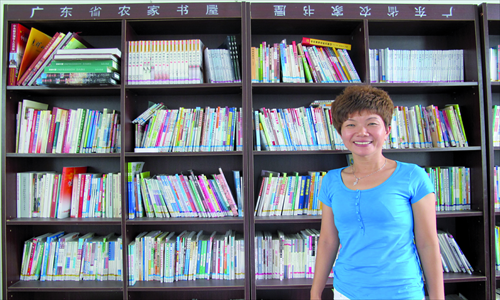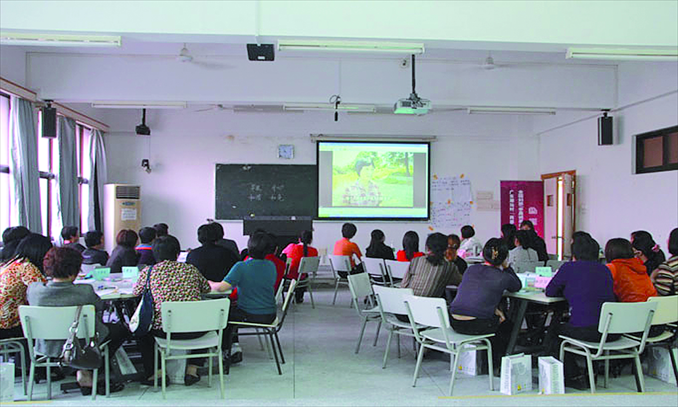
Zhang Shunying, deputy Party secretary of Shangxi village, Shantou, poses for a photo in her office. Photo: Lin Meilian/GT
An embarrassing scenario is often repeated as a woman and a group of male officials sit in an office discussing village affairs. A villager comes in and directly approaches a male official to voice their concerns. Then the male official turns and reports the problems to the woman. Although she outranks them, she is often ignored.
She joined the village committee back in 2008. Sadly, being the only woman, she often remains quiet during meetings, seldom giving her two cents on village affairs.
Nobody would expect that 39-year-old Zhang Shunying, deputy Party Secretary of Shangxi village, Shantou, Guangdong Province, would become an example for women officials after a week of training.
"I know I don't enjoy high prestige among the villagers, but I try to prove that I am friendlier and more approachable than my male colleagues," Zhang told the Global Times.
Women like Zhang account for about 21 percent of over 465,000 government officials in Guangdong Province. For the very first time, there is at least a woman in every one of 25,370 village committees across the province.
However, nationwide, this impressive tableau tapers away. At the provincial level, only one Party secretary - Sun Chunlan in Fujian Province - and only one provincial governor - Li Bin in Anhui Province - are women.
New avenue
To solve this disparity, a project named the Rural Women Officials Training Pilot Program has been jointly organized by Guangdong's Shantou University and the Li Ka-shing Foundation. Started back in 2010, it aims to promote political participation among rural women and works to ensure parity between genders in the grassroots political arena.
Lai Xiaolin, a psychology professor from Shantou University and one of the trainers on the project, told the Global Times that rural women officials in China are facing increasing pressure. "This pressure is beyond compare," she said. "It is hard for them to work on their careers while fulfilling a traditional role within the family. This is particularly true in rural areas, which are still full of social conflicts and discrimination."
Over 4,300 female officials from Guangdong, Guangxi and Anhui province have participated in the training program since it began and have studied policy, law, computer skills, and crisis management.
Two years ago, when Zhang was elected as deputy Party Secretary, she said she had to think twice before taking on the task. "I didn't really want to accept the job. Because the harder you work, the easier it is to offend people," she said.
"When you are not an official, people say good things about you; when you are an official, people play up your shortcomings," she added.
But now, she said she is gearing up to become a force for good in the village.
"I have become more confident in voicing my opinion in a male-dominated setting on the committee and villagers have started coming directly to me for advice and help."
Training women leaders
Chinese history has not been kind to women, keeping them on the bottom rung of society. Even today, women make up 60 percent of the rural workforce and enjoy less respect and status than men in the workplace.
Similar training programs have been launched all over the country by the All-China Women's Federation to encourage women to stand up for their own rights.
Professor Lai said they do not expect that these female officials will all have the ambition of scaling the political ziggurat, but the program aims to empower them nonetheless.
Limited education, however, has become an obstacle to their participation in politics. Only 42 percent of women aged over 30 in China have received a high school education and further training opportunities are rare.
"If the training didn't specifically require women to participate, I wouldn't have the chance to go," Zhang quips. She made friends and shared experiences with other female officials from around China. In class, they voiced their concerns and views on how to handle rural conflicts or disputes. For those having trouble writing, discussion panels or artistic settings were put in place to assist them.
Among some 30 students in the class, four women, including Zhang for a seed project she put forward, won a 4,000 yuan cash prize. Zhang said she is going to use the money to build up an entertainment area equipped with computers, books, and a television in her village.
The project has ended but the women have a long way to achieve true equality.
Female village officials have class in Shantou University, Guangdong Province. Photo: qipu.stu.edu.cn
Changing roles
Chinese rural women still mostly tend to the farm and take care of the children and elderly. This is slowly changing as they achieve more independence and enter elections to become village chiefs with some chance of success.
Established in the 1980s, under the implemented law of village committees, villages now have direct elections. Candidates are selected directly by farmers through a process of nomination, campaign and voting every three years.
However, the process is not always open and transparent. Reports of bribery and other problems are rampant. Moreover, a widespread habit of clans forming in villages is among the obstacles that block talented women from participating in polices, Lai explained.
The trainers confirmed that many women in their class had a strong desire to play a part in politics. Wang Weiying, 53, member of a village committee in Renheli, Shantou, who was trained at Shantou University, is ambitious about the upcoming selection.
Since joining the village committee in 1989, she has been serving in different positions, including becoming head of her village from 1996 to 1999. Now she is in charge of family planning. The question that she was most concerned about was "how much should be charged to people having more babies in your village?"
Wang's rival for the position is another woman that she says is less experienced but has more political connections, whom she views as a real threat. Wang learned how to use computer during the training, but soon forgot.
"The training was so hard that I lost 2 kilograms in a week," she jokes.
Wang believes her advantage is her experience as a mediator. She has often visited women who wish to have more than one child to try and talk them out of it. She has also mediated for couples who are having marital troubles.
Solving disputes is something that female officials excel at more than their male counterparts, according to law professor Zhang Qin of Shantou University.
The class aims to raise legal awareness among female officials engaged in family planning and their capacity to administrate following the letter of the law. One example that came up in class was the seemingly simple concept of writing down formal notes when villagers borrow things from one another.
"People don't write a note when they borrow something as they worry it might make them 'lose face." But later, this causes problems when disputes happen," he said.
Guo Erqing, Party secretary of the village of Xiaonan in Hubei Province, tells a different tale. In her words, she was able to earn the trust and respect of the village by helping solve different crises.
On one occasion, a land dispute led to the village head being attacked and stabbed in the hand. Guo sprung into action, taking control of the situation by dispatching the man to hospital and sending officials to the home of the attacker, to prevent a reprisal by the village head's family. Both the families involved wielded huge influence in Xiaonan. To avoid a vendetta from starting, Guo persuaded the attacker to turn himself in to authorities but then worked with police to see him reprimanded but not face charges.
"I was worried that any conflict in the village might scare our investors away. So I told them we need to solve the problem peacefully and take the interest of the village into consideration," she said.
From then on, she said the villagers saw her in a different light, treating her with more respect.
Glass ceiling
A total of 37 women currently sit on provincial standing committees, making up only nine percent of standing committee members, according to a People's Daily report earlier this month. This proportion diminishes the higher up the ranks you go. At present, there is no woman at the top of the pyramid on the Standing Committee of the Politburo.
Some argue that the earlier retirement age for female officials is partly to blame. China allows female officials to retire at 55 and female blue collar workers at 50, while all men retire at are 60. There is a growing cry that a woman in her 50s still has much to contribute and can take on bigger responsibilities. However, forced retirement removes this option and does not allow them to rise further.
"The authorities should consider a flexible age range for female officials to retire at across different working groups or give them the same retirement age as male officials," said Zheng Guiying, director of Guangdong's Women Workers' Committee.
Zhang believes the gender inequality is behind everything and points to other difficulties that turn women off politics.
The salaries are low and the job is hard. "Many women here prefer to work in the factory to make more money," Zhang said. "If we spend time and energy to train the women, but villagers eventually choose men to head up the village committee, then all our efforts might have been in vain."

